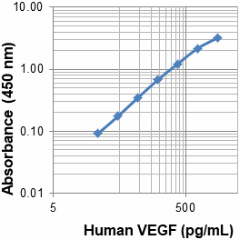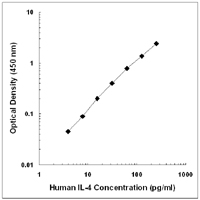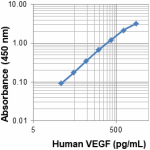- Clone
- A15136H (See other available formats)
- Regulatory Status
- RUO
- Other Names
- VEGFA, VEGF-A, VPF, MVCD1, vascular endothelial growth factor
- Isotype
- Mouse IgG2b, κ
- Ave. Rating
- Submit a Review
- Product Citations
- publications

VEGF (also known as VEGF-A) is a signaling protein with strong vascular permeability activity that stimulates the formation of new blood vessels during the processes of vasculogenesis and angiogenesis. It is a member of the vascular endothelial growth factor family, which in mammals is comprised of VEGF-A, VEGF-B, VEGF-C, VEGF-D, and PlGF (placental growth factor). There are multiple isoforms of VEGF that result from alternative splicing of mRNA. VEGF binds and activates two tyrosine kinase receptors, VEGFR1 (Flt-1) and VEGFR2 (KDR/Flk-1), through which VEGF exerts its mitogenic effects. VEGF is highly expressed in solid tumors of breast, lung, renal, colorectal, and hepatic origin. Additionally, it significantly contributes to ascites tumor formation. Beyond cancer, VEGF has also been associated with multiple pathogenic conditions including rheumatoid arthritis, age-related macular degeneration, Crow-Fukase syndrome, sclerosis and Alzheimer’s disease.
Product DetailsProduct Details
- Verified Reactivity
- Human
- Antibody Type
- Monoclonal
- Host Species
- Mouse
- Immunogen
- Recombinant protein
- Formulation
- Phosphate-buffered solution, pH 7.2, containing 0.09% sodium azide.
- Preparation
- The antibody was purified by affinity chromatography.
- Concentration
- 0.5 mg/ml
- Storage & Handling
- The antibody solution should be stored undiluted between 2°C and 8°C.
- Application
-
ELISA Capture - Quality tested
- Recommended Usage
-
Each lot of this antibody is quality control tested by ELISA assay. For ELISA Capture applications, a concentration range of 1 - 4 µg/mL is recommended. To obtain a linear standard curve, serial dilutions of VEGF recombinant protein ranging from 23.4 to 1,500 pg/mL is recommended for each ELISA plate. It is recommended that the reagent be titrated for optimal performance for each application.
- Application Notes
-
The purified A15136H antibody is useful as the capture antibody in a sandwich ELISA assay, when used in conjunction with the biotinylated Poly5225 antibody (Cat. No. 522503) as the detection antibody and Recombinant Human VEGF (ELISA Std.) (Cat. No. 560309)
- RRID
-
AB_2783345 (BioLegend Cat. No. 537002)
Antigen Details
- Structure
- Homodimer
- Distribution
-
Widely expressed
- Function
- VEGFA is a key player in vasculogenesis, the formation of blood vessels from progenitor cells, as well as angiogenesis. The expression of the VEGFA gene is upregulated via hypoxia, estrogen, and NF-κB pathways. In addition VEGF is upregulated by PDGF-BB, P1GF, TGFβ1, IGF1, FGFs, HGF, TNFα, and IL-1. VEGFA induces proliferation and cell migration in endothelial cells and plays important roles during wound healing. Also, VEGF regulates hematopoietic stem cell survival.
- Interaction
- VEGFA interacts with vascular endothelial cells and monocytes/macrophages, which express VEGFR1. This interaction induces proliferation of endothelial cells and stimulates migration of monocytes/macrophages
- Ligand/Receptor
- Vascular endothelial growth factor (VEGF)-A binds and activates two tyrosine kinase receptors, VEGFR1 (Flt-1) and VEGFR2 (KDR/Flk-1)
- Molecular Family
- Cytokines/Chemokines
- Antigen References
-
- Conn G, et al. 1990. Proc. Natl. Acad. Sci USA 87:1323.
- Gerber H, et al. 2002. Nature 417:954.
- Shibuya M. 2006. J. Biochem. Mol. Biol. 39:469.
- Shibuya M. 2008. BMB Rep. 41:278.
- Monaghan-Benson E, et al. 2010. The American Journal of Pathology 177:2091.
- Koch S and Claesson-Welsh L. 2012. Cold Spring Harb Perspect Med. 2:a006502.
- Gene ID
- 7422 View all products for this Gene ID
- UniProt
- View information about VEGF on UniProt.org
Related Pages & Pathways
Pages
Related FAQs
Other Formats
View All VEGF Reagents Request Custom Conjugation| Description | Clone | Applications |
|---|---|---|
| Purified anti-human VEGF | A15136H | ELISA Capture |
Customers Also Purchased


Compare Data Across All Formats
This data display is provided for general comparisons between formats.
Your actual data may vary due to variations in samples, target cells, instruments and their settings, staining conditions, and other factors.
If you need assistance with selecting the best format contact our expert technical support team.











Follow Us